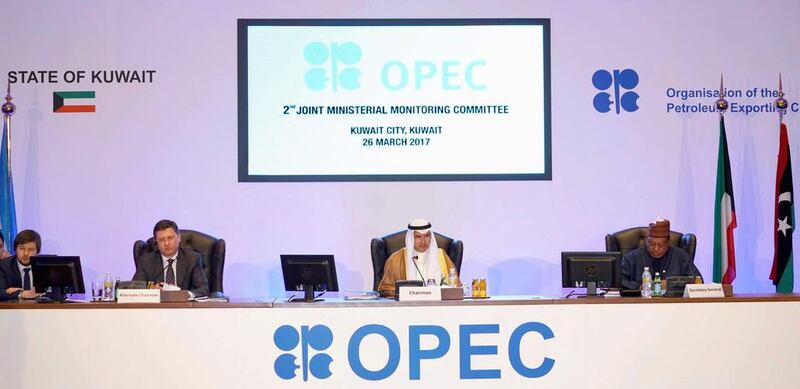The committee of Opec and non-Opec oil ministers overseeing compliance with their output-cutting deal noted some progress but also room for improvement after their regular monthly meeting in Kuwait City yesterday.
Essam Al Marzouq, Kuwait’s oil minister, told reporters after the meeting that “more has to be done” for all participants to comply with their pledged cuts.
The monitoring committee is made up of three oil ministers from Opec, including Venezuela and Algeria, as well as Kuwait, plus their non-Opec counterparts from Russia and Oman.
The deal reached by Opec at the end of November and followed by commitments from 11 non-Opec members, led by Russia, pledged total cuts of about 1.8 million barrels per day from last October’s levels to speed along a reduction in world inventories which had depressed prices for more than two years.
The meeting is their third since the deal began officially in January and comes with oil prices under renewed pressure because of doubts about its effectiveness.
Oil prices had been trading in a fairly steady range for the past three months, with North Sea Brent crude futures between US$55 and $58 per barrel.
But prices fell sharply early this month on a combination of mounting evidence that higher US shale production has been filling the gap left by Opec and non-Opec cuts, as well as some confusing comments from Opec ministers about how well their deal is holding together and whether it is likely to be rolled over when its initial six-month run expires in June. Brent futures ended last week at $50.80 per barrel, down about 9 per cent since the start of the month.
News agencies reported that an early draft statement called for a rollover of the deal. But that was not in the final statement and the Kuwait oil minister stated the obvious when he noted that only the Opec/non-Opec group as a whole will decide that.
Mr Al Marzouq has called for a rollover and he was joined by Noureddine Boutarfa, Algeria's oil minister, who said in a television interview on Saturday that he thought the deal should be extended. Khalid Al Fatih Saudi Arabia's energy minister has commented pointedly about the patchy performance of others and how the kingdom will not continue to carry "free riders" who do not honour their pledges.
__________
Fuel for Thought blog: Saudi Arabia's communication problem
__________
Russia’s oil minister, Alexander Novak, said in Kuwait yesterday that the market “dynamics are positive” but left open whether Russia would like an extension of the deal. He has previously said Russia will meet its commitment over the full six months of the deal, implying there are much deeper cuts to come.
The joint ministerial monitoring committee has a fairly narrow mandate, which is to assess the findings of Opec’s joint technical committee, which reported to them on Friday about the arcane details of trying to count production barrels from the deal’s signatories.
Industry analysts have noted the wildly different assessments, even by Opec ministers, because of the imprecise methods the group uses to measure compliance. Because of a history of mistrust, the group does not rely on output as reported by energy ministries but instead uses "secondary sources", which covers a wide spectrum from companies tracking oil tankers on the water to news agencies' surveys of random analysts.
That has produced guesses that have ranged from 155 per cent compliance to 72 per cent, noted Platts, the market’s most widely used pricing service, last week.
The monitoring committee last month said compliance was at 86 per cent, although Kuwait’s oil minister also said last month that it was at 140 per cent because of Saudi Arabia’s deep cuts.
Saudi Arabia itself reported much different output than secondary sources’ estimates and “added to the confusion by introducing the term ‘supplies to the market’, which is new for many participants”, said Amrita Sen of Enegy Aspects.
So the main point of yesterday’s meeting in Kuwait will be “verbal intervention attempts,” as Ole Hansen, head of commodities strategy at Saxo Bank put it.
In other words, is there anything the ministers can say to the market when it reopens Monday, to allay fears that the deal may fall apart before it has had a chance to eat into the world oil glut?
amcauley@thenational.ae
Follow The National's Business section on Twitter





